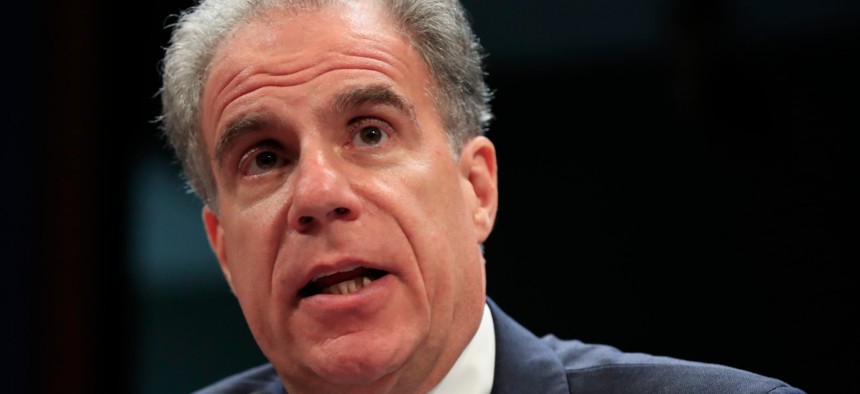Inspector General Vacancies Continue to Jeopardize Oversight and Investigations

Justice Department Inspector General Michael Horowitz testified that prolonged vacancies undermine oversight work. Manuel Balce Ceneta/AP
Thirteen of 74 positions lack a permanent IG and some of the openings date back to Obama era, according to a watchdog.
Lack of permanent leadership in inspector general offices across the government has been a persistent issue that puts federal oversight and investigations at risk, witnesses told members of a House subcommittee on Wednesday.
“Prolonged vacancies within [inspectors general offices] undermine the critical oversight work being done within that office,” said Justice Department Inspector General Michael Horowitz, during a hearing of the House Oversight and Reform Subcommittee on Government Operations.
According to the watchdog Project on Government Oversight, 13 of the 74 inspector general positions lack a permanent director. Of the vacant positions, 11 require presidential nomination, but only two have a person named. Several of the vacancies date back to the Obama administration, when Republicans criticized President Obama on the issue, The Washington Post reported.
Horowitz said that even though acting inspectors general have done a great job, they “don’t have the ability to push back when that independence issue comes up in quite the same way” when dealing with Congress or their agency’s leadership. “There’s a certain authority that comes with” being Senate-confirmed since only the president can remove them, he said.
Horowitz said the Council of the Inspectors General on Integrity and Efficiency, an independent oversight body of the inspector general community that he chairs, is going to list the vacant positions on Oversight.gov as well as track progress on filling them. As much as it’s the president’s responsibility to appoint officials, it’s also the Senate’s to consider nominations, he said.
Last week a bipartisan group of senators wrote a letter to the president urging him to fill the inspector general vacancies. The vacancies “impede the ability of these offices to conduct the oversight and investigations necessary to ensure that taxpayer dollars are protected, public safety risks are identified, and that whistleblowers who expose waste, fraud, and abuse are protected,” they wrote.
However, the Senate has yet to vote on the Inspector General Protection Act (HR. 1847) that the House passed in June. This bill would require the president to submit a report on vacancies that last longer than 210 days and mandate notification to Congress within 30 days if there is a change in status for an inspector general, such as being put on leave.
All but three of the current inspector general vacancies have lasted for longer than 210 days, according to the POGO figures. The longest is 1,909 days (vacant as of June 26, 2014). This is for the U.S. Export-Import Bank Inspector General; President Trump just nominated Peter Coniglio to that position on Sept. 10.
“Among the most important and misunderstood jobs in our federal government is that of the federal inspectors general,” said Rep. Gerry Connolly, D-Va. during the hearing. “[They] help Congress uncover waste, fraud, and abuse at federal agencies, and they help agencies find efficiencies that can improve service to the American public.”



